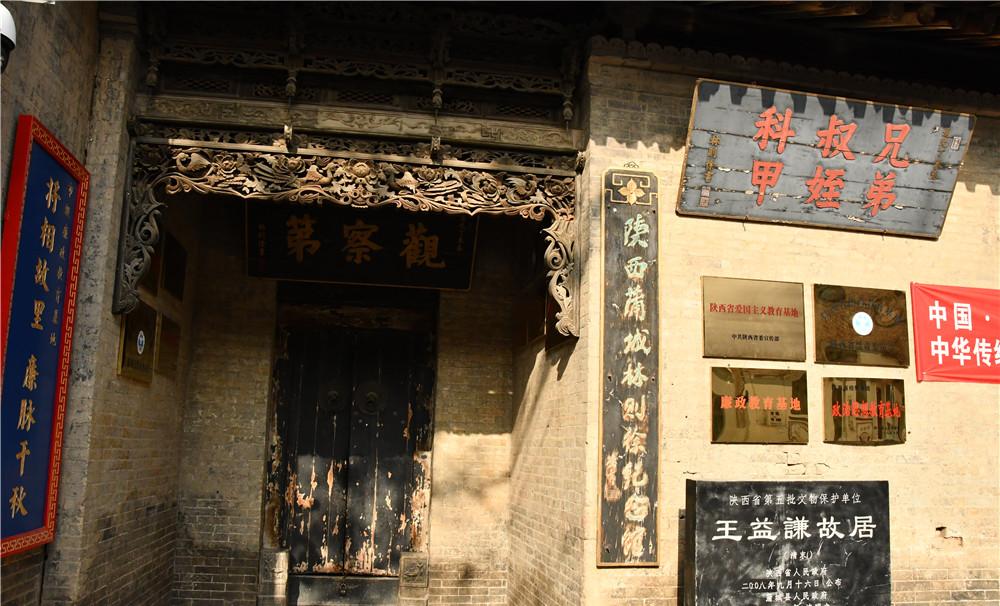
The entrance to the ancient house. Photo by Xinhua News Agency reporter Yao Youming
Xi'an, 13 Dec (Xinhua) -- Walking through the winding narrow streets and alleys, a courtyard made of green bricks and wooden beams stands on a street corner, and behind the exquisitely carved quaint gate tower hides a moving past.
Located in Pucheng County, Weinan City, Shaanxi Province, this ancient mansion, which has a history of nearly 180 years, was once the former residence of Wang Yiqian, a brother of Wang Ding, a military minister during the Jiadao period of the Qing Dynasty. The whole building covers an area of about 1050 square meters, the scale is grand, magnificent, solemn and solemn; the courtyard is a green brick floor, flying cornices and arches, carved beams and paintings, which is the most complete preserved typical "four-in-one" mansion in Guanzhong on the north bank of the Wei River.
Statues of Lin Zexu and Wang Ding, as well as "Ten Useless Benefits" compiled by Wang Ding written by Lin Zexu. Photo by Xinhua News Agency reporter Yao Youming
National hero Lin Zexu lived here for nearly three months when he was killed by his mentor and friend Wang Dingshou, leaving many historical traces. Today, it has become the Lin Zexu Memorial Hall, which serves as a patriotic education base, a clean government education base and an anti-drug education base.
"When we took over this courtyard, the house was slanted by the earthquake, and the lotus flowers and ridge beast brick carvings on the roof ridge were also mutilated, and my father insisted on the principle of 'repairing the old as the old' at that time, and traveled all over the ten miles and eight townships to collect materials from the same historical period." Gao Xiaoming, director of the Lin Zexu Museum in Pucheng County, said that the lotus flowers on the roof now have different leaves and are very rare in the folk.
In 2002, Gao Qisheng, the museum's old curator, and his eldest son Gao Xiaoming personally funded the purchase of this ancient house, and then spent more than 2 million yuan to restore the entire courtyard after 5 years and collected hundreds of ancient books on Lin Zexu's smoking ban and politics. Until 2007, the ancient house was repaired and opened to the public as the Lin Zexu Memorial Hall.
Lin Zexu had come to Shaanxi three times as an official, and had successively served as an envoy and acting envoy of Shaanxi, the governor of Shaanxi and Gansu, and the inspector of Shaanxi, but he did not leave a long-term residence in Shaanxi. We took over and repaired this yard to fill this gap. Gao Xiaoming said.
Lin Zexu stayed in Kang that year. Photo by Xinhua News Agency reporter Yao Youming
The origin of this mansion and Lin Zexu comes from a story of weeping blood. In 1841, faced with the defeat of the First Opium War, the corrupt and incompetent Qing government fantasized about Lin Zexu, who sold cigarettes in Humen, as a scapegoat and exiled him to Ili, Xinjiang. In this regard, Wang Ding followed the example of the corpse advice of the Weiguo Shi in the Spring and Autumn Period, and with the legacy of "treaties must not be allowed lightly, evil examples should not be taken lightly, Mu should not be allowed, and Lin should not be abandoned", he hanged himself in the private residence of the Yuanmingyuan. Among them, "Lin" refers to Lin Zexu.
Four years later, Lin Zexu, who had been revived, returned to Shaanxi to thank Wang Ding for his kindness, and he took a 3-month leave to go to the home of Wang Yiqian, a brother of wang Ding in Pucheng County, to mourn for his mentor. During this period, Lin Zexu inscribed 8 plaques for the Wang Residence, such as "Weilan Book House", "Huaiyin Mountain House" and "Shouxuan Hall", and also left many ink treasures, of which 7 plaques are well preserved.
Li Yonghong, deputy director of the Lin Zexu Museum in Pucheng County and wife of Gao Xiaoming, introduced that the core concept of the museum is to show Lin Zexu's great patriotic spirit and his glorious deeds in the history of human anti-smoking. In the past 20 years, the memorial hall has continuously collected and studied the historical materials of Lin Zexu's honest administration and anti-smoking ban, and compiled these precious historical materials into books and paintings to convey them to visitors more intuitively.
In addition, the memorial hall also produced a group of sculptures of Humen selling cigarettes, and arranged special exhibitions such as "The Origin of Opium and its Harm to the Chinese People" and "The Beginning and End of Humen Tobacco Sales". Since its opening in 2007, more than 1 million people have visited the museum, including students from all over the country, as well as party members and cadres and masses from surrounding cities.
Pointing to the various exhibits of late-day smoke guns in the display case, Li Yonghong said that opium was once deeply poisonous to the Chinese nation. Nowadays, new types of drugs are emerging in an endless stream, and we must learn lessons, uphold Lin Zexu's patriotic spirit, and persist in the public welfare cause of drug control.